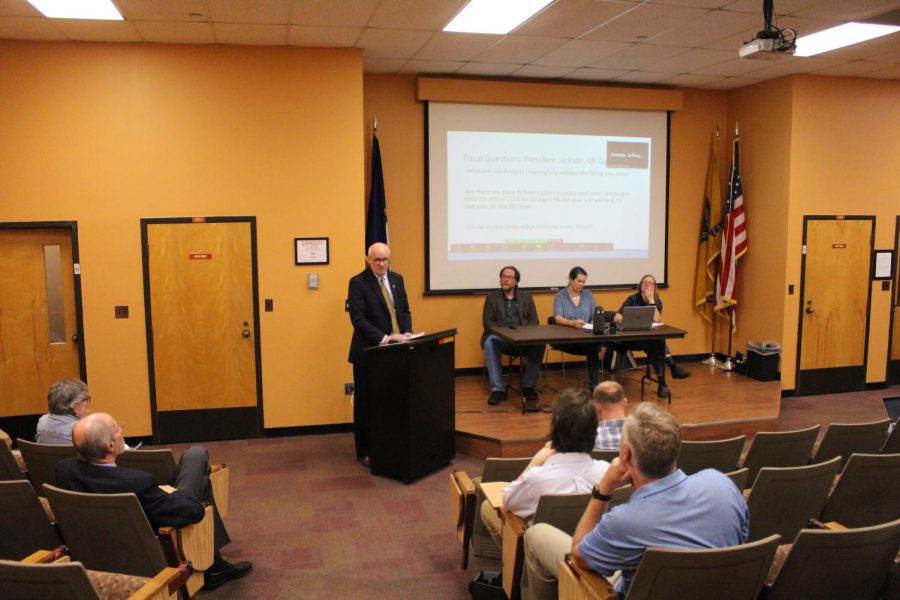Faculty vote on COLA distribution
The Faculty Senate discusses salary, campus safety, faculty retention with admin
Faculty Senate met on Tuesday, Nov. 1 for its monthly meeting which included an administrative Q&A forum. (Dionte Berry/The News)
November 3, 2022
After President Bob Jackson would not confirm an 8% cost-of-living adjustment (COLA), the Faculty Senate voted for its representatives to recommend a tiered COLA to the Budget Advisory Committee.
The motion came from a survey conducted among faculty about their COLA preferences. Of the 268 respondents, 27% preferred a fixed percentage of their salary, 22% preferred a flat amount and 51% preferred a tiered COLA—a mixture of a flat amount and a fixed percentage.
The goal was to restore some purchasing power for lower-paid faculty, who are the most affected by inflation.
The Board of Regents unanimously approved a 3% COLA back in June, the largest since 2013-14. However, there is still a more than 5% gap between the adjustment and the 8.2% inflation rate in the U.S., according to the U.S. Bureau of Labor Statistics.
The Faculty Senate held a Q&A forum to address faculty concerns with Jackson, Vice President of Finance and Administrative Services Jackie Dudley, Provost Tim Todd and Vice President of Student Affairs Don Robertson.
Members anonymously proposed questions before the session. The first— “what is the administration doing to meaningfully address the falling pay value?” The next two questions asked if there were any plans for a salary increase, or if faculty could expect better COLA increases in the future.
The short answer: yes, but it’s very unlikely faculty will see an 8% COLA to match inflation, Jackson said.
President Bob Jackson breaks down revenue, expenditures to address COLA
Jackson summarized the budget as follows. Revenues are capped while expenses are growing. For example, appropriated funds don’t cover pension costs, which the University is trying to offset by growing enrollment
Tuition is the biggest source of revenue: 72% of the budget is enrollment. This leaves 28% to be filled in by state appropriations—like performance-based funding.
“Recruiting is key,” Jackson said. “We all have to do everything we can to grow our institution.”
Despite national trends, three universities in Kentucky have increased enrollment—University of Kentucky, Eastern Kentucky University and Murray State. There are 4 million fewer students today in the U.S. than 10 years ago, and 1.3 million fewer than before the pandemic.
The University can’t collect more tuition from current students to increase revenue, either. The maximum tuition increase was capped at 3% by the Kentucky Council on Postsecondary Education. A 1% increase is equal to about $600,000 in revenue.
However, the University also received $3.2 million in performance-based funding from the state for the first time.
As far as expenditures go, salary and benefits make up 72% of the budget. An increase of 1% is equal to $825,000.
The University plans to adjust COLA, but Jackson said he doesn’t know the exact number because of these moving parts. The legislative session beginning in January 2023 also may or may not affect higher education.
Members ask about campus safety, faculty protections
Comparatively, salaries among faculty and staff rank “typically in the middle” among other institutions in the state, Jackson said. He did not have specific numbers, but he suspects salaries are similar to other similar institutions.
Brian Bourke, professor of postsecondary education administration, asked what the administration has in mind to address faculty retention.
Jackson responded that other peer institutions nationally are cutting from their budget, but not the University.
“Our job is to make sure we’re recruiting and retaining students, faculty and staff,” Jackson said.
The University’s retention rate is about 74.7%—the thid highest in the state behind the University of Kentucky and the University of Louisville.
“The best and easiest students to recruit are the ones we have,” Jackson said.
He did not specify any specific plans for faculty retention.
There is growing concern among the senators regarding political influence in higher education. They cite specifically the WKMS report that 42nd Circuit Court Judge Jamie Jameson used his influence to pressure reporters not to run a story about the judge walking around the courtroom in his underwear.
Jackson said the University addresses these issues appropriately. If at any time, a faculty or staff member receives any type of communication that makes them uncomfortable, Jackson said to notify administration.
Senators raised concerns with the project management fee, which some believe had been excessive and led some departments not to pursue other needed maintenance projects.
Dudley said the fee was incurred to make sure Facilities Management staff are paid for their work. Some departments had canceled projects after they started. Individual units navigated funding through chairs and deans or worked with departments to split the cost on deferred maintenance projects.
The next question asked about the University’s response to crime. After a student was accused of attacking a group of students with a Molotov-style cocktail on Sept. 10, the University received criticism for its uncoordinated response in notifying campus—notably from the Gender Equity Caucus, who published a statement calling for better clarity in campus alerts and highlighting other cases of violence against women in the University community.
Jackson said communications were sent as soon as possible. When the email first went out, the individual was already apprehended.
“There’s always things we can do better in any of these areas,” Jackson said.
He specified he and Murray State Police Chief Jeff Gentry were assessing the weapons policy, which hasn’t been changed in the past couple years, for improvements.
Senate members have also noticed public safety officers accessing classrooms and other locked spaces outside of operating hours, seemingly without cause.
“Our police officers can go in any building and any room at any time if they have suspicions of issues that are going on,” Jackson said. “It’s to keep us safe on this campus, so they have the ability to do that.”
Another question was raised about the concern of the recent loss of many high-achieving junior faculty.
Jackson said he’s concerned by the statement. However, he said he looked at six years of information, and last year, 18 faculty members retired, and the six-year average is about 15.
There were 22 resignations, and the six-year average is 19.
He looked at the ages of those leaving as well—in the 20-30 age range, one person left. In the 30-40 age range, 10 left, which is around the average.
A member asked for rationale concerning the change in the audit date.
Jackson said the University ran out of federal financial aid compliance. All other Kentucky schools’ deadlines to audit were the last day to add classes because of financial aid reasons as well.
In spring 2022, department chairs, undergraduate studies committee, graduate studies committee and academic council approved this change.
Faculty Senate addresses intragroup issues
Faculty Senate President David Roach announced a Constitutional Convention will be held at 2:30 p.m. on Dec. 6.
The convention will vote on amendments for the Faculty Senate’s constition.
Three amendments will be voted on:
- Amendment 1, which would create a sixth at-large senator representative for instructors only
- Amendment 2, which would create three new senate seats for officers
- Amendment 3, which would extend the faculty senate officer term to two or three years
The University said students who park on campus for Greek Life events can work with Parking Services to fill out requests for these events in order to not get ticketed.
Dudley said she did not believe parking for faculty would be increased.
The next Faculty Senate meeting will be on Dec. 5.


























































































